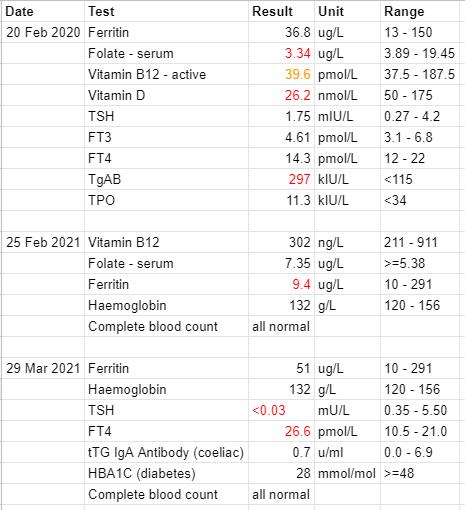Sorry in advance for long post
I had a thyroid check via Medichecks in Feb last year because I was feeling cold all the time and having problems with my memory. The thyroid results were normal (although I did have Tg antibodies, but I understand these are also common in healthy people), but I was deficient in Vit D and folate, and low in B12. I took supplements for about six months after that.
I went to my GP in Feb this year because I was getting lightheaded on standing up. BP measurements confirmed a significant drop from sitting to standing = orthostatic hypotension (OH). I was tested for anaemia and found to be iron deficient but not anaemic. I was prescribed iron supplements.
After three weeks, I was still having the OH and also started having palpitations, so I went back to the GP last week. This time my thyroid was tested, and the results shows I am hyperthyroid. Diabetes and coeliac tests were normal. I also had an ECG which was normal.
Other than the recent palpitations, I wasn't aware of any hyperthyroid symptoms (I still generally feel cold all the time rather than hot). However looking back at my Fitbit data over the past month, I can see that my average resting HR has increased, as has my HR whilst walking/cycling, and I have also lost 4-5lbs in the past 2-3 weeks, whereas I was previously maintaining for about three months (having gradually lost 3 stone last year, through diet and exercise). I've also been waking up earlier than I want to and being unable to get back to sleep. But I feel completely fine other than the OH and occasional palpitations.
The GP is referring me to an endo, which will apparently take months. In the meantime, she will ask them if I should be started on antithyroid medication. She offered me beta blockers, but I declined, as even during the palpitations my HR remains below 100, and I am worried it will make the OH worse. I am going to get my vitamins re-tested through Medichecks.
So my initial questions are:
1) Is it worth testing FT3? Will that give me any useful information?
2) TSH can obviously only go down to 0. How high can FT4 go? Does severity of symptoms correlate with the level?
3) Is it worth testing for TRAb to check for Graves? Or does my previous positive TgAB result already indicate that it is (likely? definitely?) autoimmune?
4) Is it worth seeing an endo privately, since I am going to have to wait months if not? If so, should I look for anything in particular when choosing one?
5) Related to the last qu, is there a value in treating hyperthyroidism sooner rather than later? It looks like this has been caught early in my case, since I only have minor symptoms and they only started recently. If this is important, then I'll look into the private option.
6) OH (my main symptom, which initially took me to the GP) doesn't appear to be a symptom of hyperthyroidism. My GP is going to check that with the endo team, but does anyone have any experience of this?
Any thoughts or experiences on any of the above would be really helpful. Thanks in advance.


